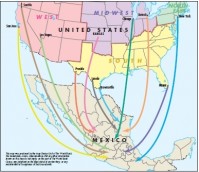N ew Orleans Remittances are a huge part of the Gross National Product (GNP) of many countries around the developing world. In fact some countries like Mexico, the Philippines, and others seem to be surviving largely because they are exporting workers who are sending back money to support families. Remittances are the life blood and often the life line for migrant workers and immigrant families when globalism is often characterized by economic refugees.
ew Orleans Remittances are a huge part of the Gross National Product (GNP) of many countries around the developing world. In fact some countries like Mexico, the Philippines, and others seem to be surviving largely because they are exporting workers who are sending back money to support families. Remittances are the life blood and often the life line for migrant workers and immigrant families when globalism is often characterized by economic refugees.
Remittances are also a free fire zone for predatory pricing and practices.
ACORN International is in the last stages of pulling together a dynamite report on remittances between the developed world and the countries where we work thanks to our ace Toronto based intern army and voluntary researchers in Baltimore, Little Rock, and the countries where we organize. Seeing the pieces come together what is amazing is the size of the total pie and the huge slice that sticks to the financiers!
Even in the recession the numbers are huge. The World Bank estimates that the total level of remittances between countries is around $443 Billion USD, which is a breathtaking amount of money, and likely understated because it may not reflect fully the level of informal transfers and gifts between families. The World Bank also estimates that the “average” cost of remittances – stay tuned for our report in the next two weeks on this! – is about 10%. The math is easy to follow and it puts the transaction cost for remittances to the bankers and transfer companies like MoneyGram and Western Union at over $44 Billion USD!
This is obviously a blatant teaser for the upcoming ACORN International report and its release before Christmas when remittances spike upwards, but mentally start making a list of the differences 30 or 40 billion USD might make in poverty reduction and community development for lower income families if they were allowed to see more of the money in their hands as opposed to fleeced along the way.
It ought to be a crime! We will look as well at why it’s not only not a crime but instead such predation is allowed to be practiced with impunity in an anarchy of no regulation or questionable regulation and ignorance in many countries.
Think about it.